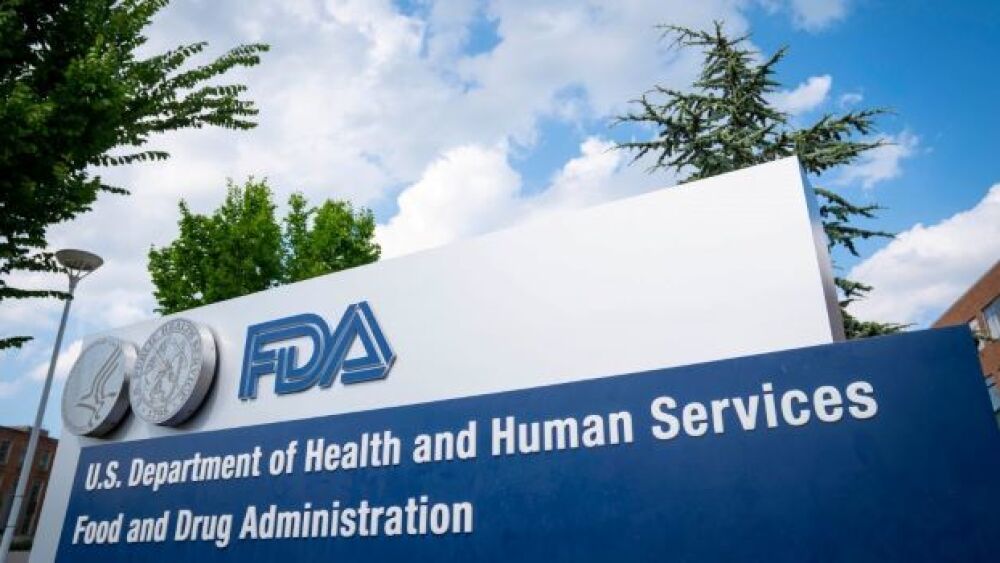Last year, the FDA’s Center for Drug Evaluation and Research approved 50 drugs. A new study found that 33, or 66% of them, were supported with genomic data.
Sarah Silbiger/Getty Images
One of the tenets of “personalized medicine” is that medications will be tailored to individuals based on their personalized genetics. Last year, the U.S. Food and Drug Administration’s Center for Drug Evaluation and Research approved 50 drugs. A new study found that 33, or 66% of them, were supported with genomic data.
Specifically, the study “investigated the proportion of new approvals that can be retrospectively explained based on publicly available human genetic information by using a mix of systematic mapping and manual curation.
“We concluded that for 33 out of 50 (66%) of the FDA-approved new drugs in 2021, the genes coding for their primary assigned targets, or for proteins that are known to physically interact with these targets, have been previously associated in some way with the indication for which the drug is approved or a closely related phenotype.”
Genetic Data Not Always Clear-Cut
The authors, affiliated with the Wellcome Sanger Institute in Cambridgeshire, U.K., note that the genetic data with certain drugs is not always clear-cut. They point to Bayer’s Kerendia (finerenone), a NR3C2 antagonist approved last year for chronic kidney disease (CKD), as an example of both the opportunities and challenges of “developing a therapeutic hypothesis based on genetic evidence.”
Genome-wide association studies (GWAS) were conducted that suggested an intronic variant in NR3C2 is linked to microalbuminuria, an early indication of CKD. But leveraging the available genetic data to prioritize that as a target depends on identifying the mechanistic link between the variant being associated with that trait and NR3C2, as well as evaluating how relevant microalbuminuria is for CKD patients.
Other targets don’t have direct genetic evidence but do interact physically or functionally with “a genetically implicated gene product.” The researchers cite AstraZeneca’s Saphnelo (anifrolumab), which was approved last year for moderate to severe systemic lupus erythematosus (SLE). The drug is an IFNAR1 antagonist. The authors said they did not find direct genetic evidence linking SLE and IFNAR1. However, missense variants in TYK2, a kinase that physically interacts with IFNAR1, have been associated with SLE.
“Thus,” they write, “genetic associations with interacting partners can provide indirect evidence for a suitable target, and this example highlights the potential utility of pathway and network data to interpret human variation in the context of disease.”
Oncology is increasingly an area where specific biomarkers of the disease are associated with maximizing drug efficacy. As a result, detailed tumor genome characterization is common. The authors point to four of the cancer drugs approved last year which were indicated for patients with lung or bile duct cancers harboring somatic variations in EGFR, KRAS or FGFR2.
They describe Amgen’s Lumakras (sotorasib), which was specifically developed to treat patients whose non-small cell lung cancer contains a KRAS G12C mutation.
But similar testing is also being conducted on rare Mendelian diseases, such as Sarepta Therapeutics’ Amondys 45 (casimersen), which was approved in 2021 for Duchenne muscular dystrophy (DMD) that is amenable to exon 45 skipping. This requires a clear genetic evaluation of the patient’s dystrophin gene to determine exactly which mutations they have to help decide which, if any, DMD drug is right for them.
Retrospective Analysis can Fuel Further Research
However, the authors write, “When broadening to all rare indications, we found no increased genetic support in the 26 approvals receiving the FDA’s orphan drug designation compared with non-orphan drugs.”
The authors suggest that more analysis of how drug approvals are associated with genetic data is needed. “While genetics might not have influenced the decision-making behind some of the genetically supported approved drugs, the availability of such evidence can retrospectively help to understand the causal mechanisms behind their therapeutic efficacy or safety. In future, positive outcomes for genetically supported therapeutic strategies will need to be assessed rigorously to avoid the risk of confirmation bias.”





